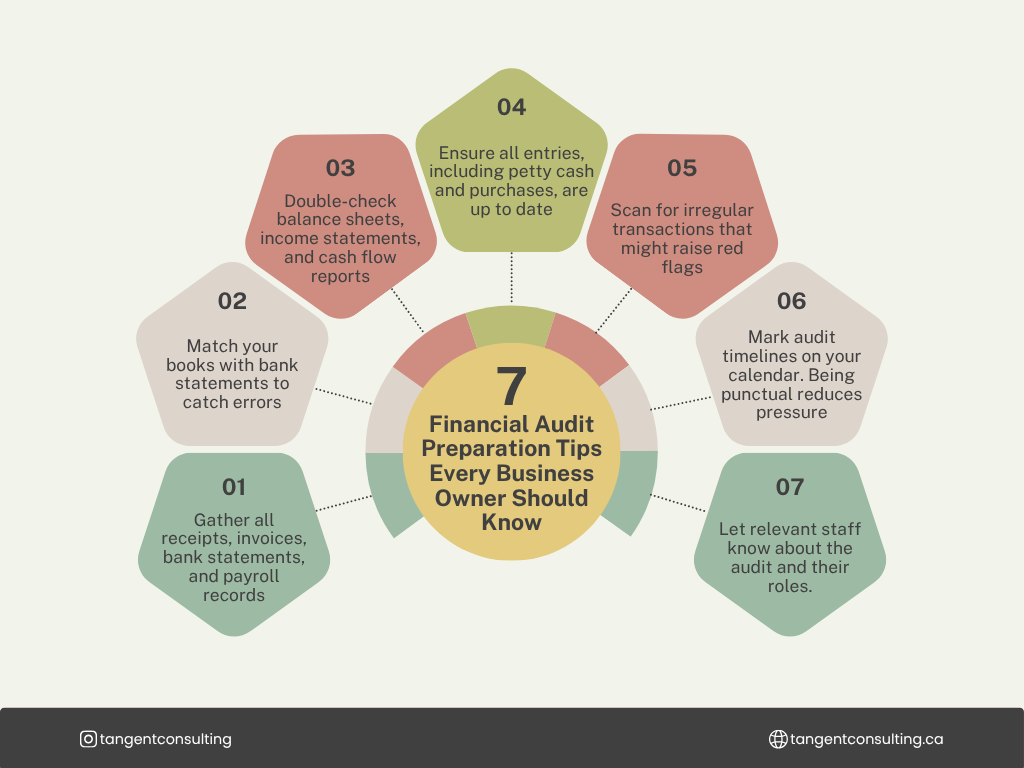7 Financial Audit Preparation Tips Every Business Owner Should Know
One of our construction company’s clients attended a tender meeting and somehow opened the wrong presentation. Instead of presenting financial reports, they opened a 2019 pitch deck.
A rather embarrassing moment, isn’t it?
What’s more embarrassing is businesses often go to financial audits unprepared. They make mistakes, such as overlooking financial reports and failing to reconcile them. This can leave a bad impression.
So, to help you avoid this, here are 7 financial audit preparation tips every business owner should know.

What is a Financial Audit?
A financial audit is a detailed check-up on your business’s finances. It’s kind of like getting a second opinion on your financial reports to make sure everything adds up. It’s also called a financial statement audit and is usually done once a year.
During the audit, everything is reviewed, including your past financial records, balance sheets, income statements, and the way you process invoices, among other things.
Still With Us?
If you’ve scrolled this far, chances are you’re serious about getting your business on track.
Book a free 15-minute strategy call — tailored to your industry — and let’s figure out what’s holding you back.
Book My Strategy Call ×Some of the main reasons to perform a financial audit are:
- To double-check that your books are accurate
- To stay on the good side of regulators and follow the rules
- To show banks, investors, or potential buyers that your numbers can be trusted
- To spot gaps in your internal processes and improve how money is managed
While you can do an audit internally, sometimes things don’t add up, especially if you’re looking to raise funds or satisfy stakeholders. In most cases, you’ll need an independent firm to do the job to avoid any conflict of interest.
For example, Let’s say a growing construction company wants a bank loan to expand. The bank won’t just take their word for it; they’ll ask for audited financial statements.
Therefore, the company hires a third-party accounting firm to review its numbers and provide a clean bill of financial health. That audit gives the bank the confidence to approve the loan.
Don’t Let Business Numbers Hold You Back 🚀
Most business owners know they should get a grip on their finances — but don’t know where to start. That’s where we come in. Book a free 1-on-1 call with Tangent Consulting and let’s untangle your numbers together.
Why Is a Financial Audit Important?
Businesses often feel jittery about financial audits; however, they are necessary to thoroughly review your business finances.
The primary purpose of financial audits is to provide investors, lenders, or board members with confidence that your financial statements are accurate and that your financial story is being presented honestly.
A proper audit shows that your finances are clean, your books are in order, and you’re not sweeping any mistakes (or shady stuff) under the rug. This helps to reduce the risk of fraud and confirms that your company isn’t showing any financial red flags.
A financial audit can also identify areas where your internal processes or controls could be stronger. In other words, it’s an opportunity to enhance the efficiency of your business operations, which can lead to more informed decision-making, smoother workflows, and a more trustworthy reputation.

7 Financial Audit Preparation Tips
Preparing for a financial audit can be a challenging and time-consuming process. But with the right steps, you can make the process a lot smoother.
Here are the 7 financial audit preparation tips you need to know:
1. Understand the Scope and Objectives
Before you dive into the paperwork, get clear on why the audit is happening and what it’s meant to cover. Is it a routine check on your annual financials? Are regulators involved? Or is it more about reviewing internal processes?
Talk to your audit firm early on. Get aligned on what they’ll be looking for, what documents they need, and when they need them. This helps prevent last-minute scrambles and makes life easier for everyone involved.
2. Organize Key Financial Documents
If your records are all over the place, your audit will be messy, just like our clients’. Start by compiling your financial statements, bank statements, general ledger, loan agreements, reconciliations, and any backup documents.
Make sure everything ties back to your accounting system. A small mismatch can slow things down or lead to more questions from the auditors. To keep things simple, use a shared digital folder, such as Google Drive, Dropbox, or your accounting firm’s portal. So everyone has easy access to what they need.
3. Keep Up with Accounting Standards
Accounting rules are not static; they’re updated regularly. So, it’s smart to make sure your finance team is in the loop when it comes to new standards or regulatory changes.
When your team knows what’s changed, they won’t waste time digging through data or scrambling to fix things at the last minute. It also helps in avoiding mistakes that could slow down the audit or cause bigger issues later.

4. Reconcile Accounts Early
One of the best ways to prepare for an audit is to reconcile your accounts in advance. That means double-checking your bank statements, credit card balances, accounts payable and receivable, and anything involving intercompany transactions.
Cross-check the numbers between your accounting system and supporting documents to catch any mismatches before your auditor does. If something doesn’t match, fix it early.
5. Do a Pre-Audit Check
Before the auditors arrive, take a moment and be Sherlock Homes. Go through your books and check if there are duplicate entries, weird journal entries, or expenses that might have slipped through the cracks.
Make sure your assets are depreciating properly, your revenue is recognized correctly, and your tax-related numbers make sense. If you catch issues now, you’ll save yourself a lot of time and stress.
Audit Survival Scorecard
How Audit-Ready Is Your Business? Take the 2-Minute Test.
Your Audit Readiness Result:
Schedule Free Consultation6. Get Your Team Ready
There’s a common misconception that audits are a finance team thing. However, it touches multiple parts of your business. Make sure your operations, HR, and finance folks know the audit is coming, the timeline, and what role they’ll play.
Select one person to be the primary contact for the auditors. This keeps communication clean, and too many cooks don’t spoil the broth. Also, make sure your team is ready to jump in with answers, documents, or explanations if needed.
7. Keep the Lines Open with Your Auditors
Audits go a lot smoother when there’s open and honest communication. So, when your auditors ask for something, don’t ghost them; respond quickly and clearly. The more organized your responses are, the fewer follow-ups you’ll be dealing with.
If you expect delays, let them know right away. It’s better to be upfront than to surprise them later.
Also, keep track of every request and response. It helps avoid confusion, keeps everyone accountable, and provides a solid paper trail in case anything needs to be revisited.
Final Thoughts
Getting ready for a financial audit might sound overwhelming, but with the right prep, it doesn’t have to be. It’s all about staying organized, keeping your records clean, and making sure everyone on your team knows what to expect.
When your documents are in order, your accounts are reconciled, and communication flows smoothly, the audit process becomes a whole lot easier, and you’re more likely to uncover helpful insights about your business.
If handling it all in-house feels too overwhelming, bringing in outside support can make a significant difference, and that’s when Tangent comes in.
For over a decade, we’ve been helping businesses like yours to lighten the load, spot issues before they become problems, and help you feel confident walking into the audit.
Let’s get your accounting system working for you!
P.S. If you are reading this, it means you can have access to our free consultation for your business. Avail this for free today before we change our mind 😉
FAQs
What are the 5 Cs of the audit?
The 5 Cs are Criteria, Condition, Cause, Consequence, and Corrective Action. They’re used to assess and explain audit findings.
What is an opening balance sheet audit?
It’s a review of a company’s assets, liabilities, and equity at the start of a new financial period.
How much time does it take to audit business accounts?
Most audits take 2–6 weeks, depending on the business’s size, complexity, and the level of preparedness of your financial records.
